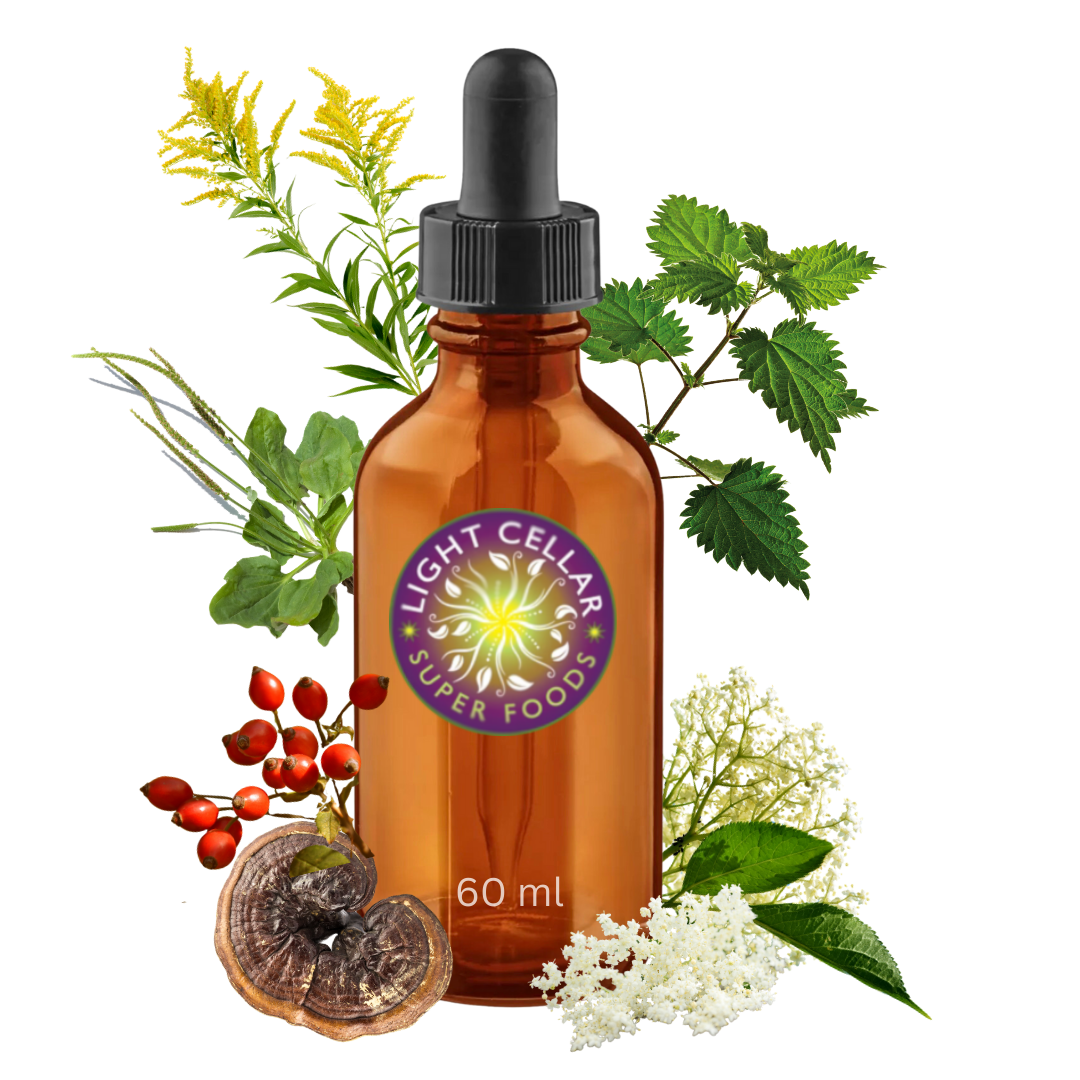
Light Cellar Apothecary
Allergy Ally Tincture
Allergy Ally Tincture
60 ml
Light Cellar
6531 Bowness Road Northwest
Calgary AB T3B 0E8
Canada
Allergy Ally Tincture
Made In-House | 60ml
Hayfever season is upon us, and we have an ally for you. This formula is inspired by the plants around us. When environmental allergies get us down, there is often something nearby that knows how to support us. Four of these herbs grow in the Calgary area, and supported by a couple of go-to herbs for allergic rhinitis, sinusitis and hypersensitivities.
Nettle
Nettle is a leader amongst our local plants, being one of the first to emerge in the spring. Astrological herbalists say that this plant is ruled by Mars, and embodies the fire element. Anyone who has touched stinging nettle would agree. This energizing herb is shown to reduce inflammatory reactions leading to allergic rhinitis by blocking the histamine 1 receptor, and preventing mast cell degranulation (Roschek, Fink, McMichael & Alberte, 2009). It also helps with elimination of waste products through the kidneys, which is also relevant in cases of eczema and rheumatism.
Nettle has a rich history of supporting humans in all kinds of ways. The root is often used for prostate support. The fibers and used in clothing to keep us warm. The seeds come out in the summer to help those of us who are burnt out and over worked.
Reference: Roschek, B., Jr, Fink, R. C., McMichael, M., & Alberte, R. S. (2009). Nettle extract (Urtica dioica) affects key receptors and enzymes associated with allergic rhinitis. Phytotherapy research : PTR, 23(7), 920–926. https://doi.org/10.1002/ptr.
Reishi
This mushroom is an immune-modulator thanks to its polysaccharides and triterpenes. This helps with hypersensitivity to perceived threats in the respiratory system. It is traditionally used to soothe those mucous membranes. Reishi may help to reduce the inflammatory response triggered by allergies. It also supports the liver in eliminating allergens from the body.
Rosehips
Rosehips are a standout in the landscape at the time when we are preparing for allergy season. They are the key local source of vitamin C in the Calgary area. Vitamin C is shown to be helpful in the histamine reactions that cause those seasonal allergy symptoms. It helps to stabilize mast cells, prevent the release of histamine, and breakdown histamine. It may also help to reduce oxidative stress and inflammation.
Goldenrod
Different varieties of Goldenrod grow all over the world, including in Alberta. This local plant is known as an anti-catarrhal - a go-to ally for when your nose won’t stop running. Goldenrod also contains quercetin - vitamin C’s key partner for allergy relief. Quercetin is a flavonoid found in many plants that prevents the release of histamine from mast cells. Goldenrod also helps to eliminate waste products through the kidneys, reducing inflammation in the body.
Elderflower
The Elder tree has evidence of supporting humans for 17,000 years. The flower is used in this formula for their anti-catarrhal and anti-inflammatory properties. Elderflower helps to reduce swelling, and drain mucous. These actions make it a great herb for colds as well. Elderflower may also help those with congested sinuses to sleep.
Plantain
This well-known herb is a mucous membrane tonic that can be found along paths anywhere in Canada. Plantain is especially helpful for those with chronic inflammation of the mucous membranes, such as the sinuses, nasal cavity, and lungs.
It is best to start working with these plants weeks before the worst of allergies hit, starting low and slowly increasing the dose. These herbs are very safe and the dose can be increased with the severity of symptoms, but those with oxalate sensitivity or kidney stones should avoid Nettle. People may also look to this blend if they suffer from allergies to dust mites, animals, and other airborne allergens. If you have histamine issues popping up in your digestive system, nervous system or elsewhere, we recommend seeking advice from a skilled practitioner.
Look out for these herbs when you are walking around this summer!
Note: Herbal preparations are traditionally used to support overall wellness. Individual results may vary. This product is not intended to diagnose, treat, cure, or prevent any disease. Consult your healthcare practitioner before use if you have a medical condition, are pregnant or breastfeeding, or are taking medications.

